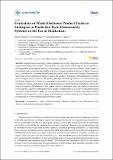| dc.contributor.author | Tozanli Yilmaz, Ozden | |
| dc.contributor.author | Kongar, Elif | |
| dc.contributor.author | Gupta, Surendra M. | |
| dc.date.accessioned | 2020-09-01T16:11:16Z | |
| dc.date.available | 2020-09-01T16:11:16Z | |
| dc.date.issued | 2020-07 | |
| dc.date.submitted | 2020-06 | |
| dc.identifier.issn | 2071-1050 | |
| dc.identifier.uri | https://hdl.handle.net/1721.1/126874 | |
| dc.description.abstract | Manufacturing and supply chain operations are on the cusp of an era with the emergence of groundbreaking technologies. Among these, the digital twin technology is characterized as a paradigm shift in managing production and supply networks since it facilitates a high degree of surveillance and a communication platform between humans, machines, and parts. Digital twins can play a critical role in facilitating faster decision making in product trade-ins by nearly eliminating the uncertainty in the conditions of returned end-of-life products. This paper demonstrates the potential effects of digital twins in trade-in policymaking through a simulated product-recovery system through blockchain technology. A discrete event simulation model is developed from the manufacturer’s viewpoint to obtain a data-driven trade-in pricing policy in a fully transparent platform. The model maps and mimics the behavior of the product-recovery activities based on predictive indicators. Following this, Taguchi’s Orthogonal Array design is implemented as a design-of-experiment study to test the system’s behavior under varying experimental conditions. A logistics regression model is applied to the simulated data to acquire optimal trade-in acquisition prices for returned end-of-life products based on the insights gained from the system. | en_US |
| dc.publisher | Multidisciplinary Digital Publishing Institute | en_US |
| dc.relation.isversionof | 10.3390/su12135416 | en_US |
| dc.rights | Creative Commons Attribution | en_US |
| dc.rights.uri | https://creativecommons.org/licenses/by/4.0/ | en_US |
| dc.source | Multidisciplinary Digital Publishing Institute | en_US |
| dc.title | Evaluation of Waste Electronic Product Trade-in Strategies in Predictive Twin Disassembly Systems in the Era of Blockchain | en_US |
| dc.type | Article | en_US |
| dc.identifier.citation | Özden Tozanlı et al. "Evaluation of Waste Electronic Product Trade-in Strategies in Predictive Twin Disassembly Systems in the Era of Blockchain." Sustainability 12, 13 (July 2020): 5416 ©2020 Author(s) | en_US |
| dc.contributor.department | Massachusetts Institute of Technology. Center for Transportation & Logistics | en_US |
| dc.relation.journal | Sustainability | en_US |
| dc.eprint.version | Final published version | en_US |
| dc.type.uri | http://purl.org/eprint/type/JournalArticle | en_US |
| eprint.status | http://purl.org/eprint/status/PeerReviewed | en_US |
| dc.date.updated | 2020-08-21T13:48:43Z | |
| dspace.date.submission | 2020-08-21T13:48:42Z | |
| mit.journal.volume | 12 | en_US |
| mit.journal.issue | 13 | en_US |
| mit.license | PUBLISHER_CC | |
| mit.metadata.status | Complete | |
